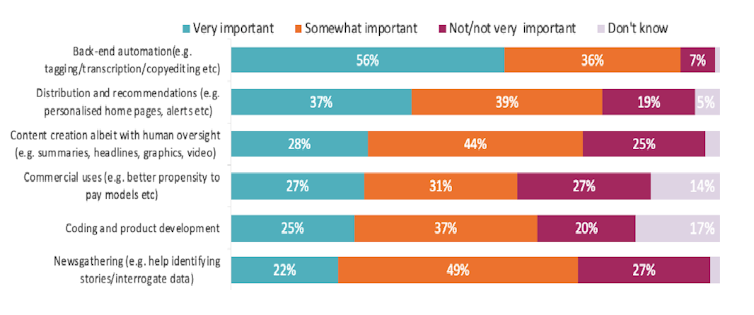News Publishers are the spine of any economy as they make or break its image. With artificial intelligence (AI) having an ever-increasing impact on both the news industry and its consumers, news organizations are preparing for major upheavals. Some colleagues at the Reuters Institute for the Study of Journalism compiled a survey of 314 editors, CEOs, and other digital leaders from over 50 countries for our most recent journalism trends report. They discovered that 47% of them are confident about the prospects of journalism in 2024.
The news sector had a rough patch for several years, as detailed in the report. There have been significant drops in revenue due to many factors, including a decrease in online advertising, a slowdown in the increase of subscriber numbers, and a quick dip in referrals from social media.

There is widespread concern that search volume will follow Facebook referrals’ 48% decline in the previous year, according to industry data. The publisher at the New York Times claims that, without their consent, digital companies like Google and Microsoft are planning to release chat-based interfaces powered by artificial intelligence that are being trained on publisher material.
However, it’s more than merely searching the web. The way we find and enjoy material of all kinds will also be transformed by the increasing number of conversational artificial intelligent assistants integrated into various devices, including computers, mobile phones, and even cars. The AI interface is becoming more adept at answering news queries directly. Meanwhile, publisher websites’ links to news sources fade into the background. Consequently, each publisher’s site will see a significant drop in audience eyeballs.
Given this context, it’s hardly shocking that Axel Springer and AP are among the publishers that have inked arrangements with AI firms. However, the New York Times is suing over what it claims is the unlawful use of its published works to train artificial intelligence systems.
The publishing industry is crossing its fingers that this time around, the verdict will go in favor of news organizations that provide readers with fresh, high-quality content. “There is an opportunity for the industry to work with AI players to design a symbiotic ecosystem, and that’s an opportunity we must not squander,” argues the chief operating officer of a prominent UK news provider, who wishes to remain unnamed.
They found that most publishers are pessimistic about the outcome of this latest round of discussions. Nearly half of those who took the survey expected that, in the end, no publisher would get much revenue, and over a third of those who did so believed that just a few large media corporations would reap the rewards.

Publishers are wary about accepting money from large AI firms. Money isn’t the only thing that matters to the industry. Seventy percent of people who took the survey are worried that people will have less faith in the news if generative AI becomes widely available. “The explosion of crap content has the potential to shake the trust,” remarks Christoph Zimmer, chief product officer of German news business Der Spiegel.
Though he expresses a desire for “trusted news media to differentiate ourselves more clearly” in response to the broad availability of low-quality content, Zimmer expresses worry about the usage of deep fakes and other forms of synthetic media.
News Publisher Are Striving for change:
Publishers are aware that there are substantial chances to improve the efficiency of their newsrooms, even while there are concerns associated with business models, platforms, and trust that must be addressed. The poll indicated that most publishers are concentrating on back-end automation in 2024, with 56% aiming to use AI for copyediting, metadata development, and translation. Identifying better methods to recommend content was the second most prevalent AI-related target, with 37% of publishers following suit.
“The most compelling user case for AI in newsrooms is in the automation of routine jobs,” writes Ed Roussel, head of digital at The Times and Sunday Times. He added that Reporting stories will still be done by journalists; we just do not think AI can do it.
By the year 2024, which applications of AI in the newsroom will have made the most impact? The reputational risks associated with utilizing AI for content have made news executives prioritize back-end automation. However, that will not deter others from continuing. Even though it’s overseen by humans, one German daily utilizes an AI bot to compose 5% of its articles. Publishers in the Nordic countries regularly include AI-written summaries in their stories.

Channel1.ai, set to debut this year, offers a personalized news channel that can speak any language, while NewsGPT is the very first 24-hour television news station built solely by AI.
Not only is journalism not immune to the rapid advancements in AI, but news executives are also aware that they cannot afford to ignore the problem. The goal of innovative news organizations should not be to increase volume through the use of artificial intelligence but rather to create one-of-a-kind content and experiences that AI cannot easily replicate. This can be achieved through human-curated live news, detailed analysis, and experiences that foster a connection between the news provider and their audience.
However, in this day and age, when many people are avoiding the news, they will also have to employ AI to streamline their operations and attract new customers.
It is more difficult to foresee how AI will affect the distribution of internet information generally. A lot will rely on how the public views the technology in the future and how ethically the platforms that distribute this content act as well. The outcome of intellectual property court battles is also crucial since it may either greatly expand or significantly limit the usage of news information for training AI models with no adequate remuneration.
Although the AI revolution is still in its infancy, many of the ground rules will likely be established this year. The news industry and its journalists must urgently reevaluate their function in light of the above.
You can read the complete report Here!




